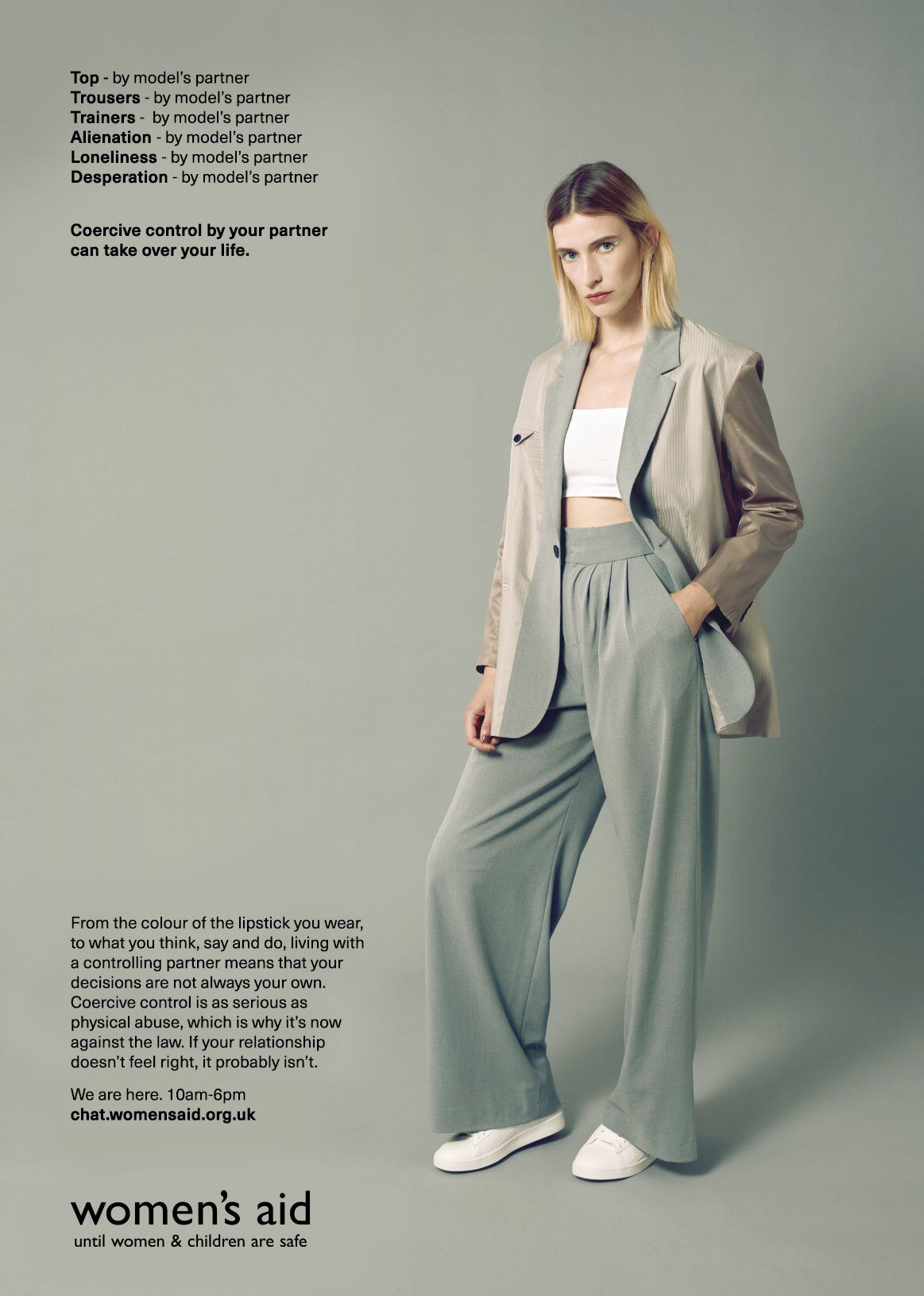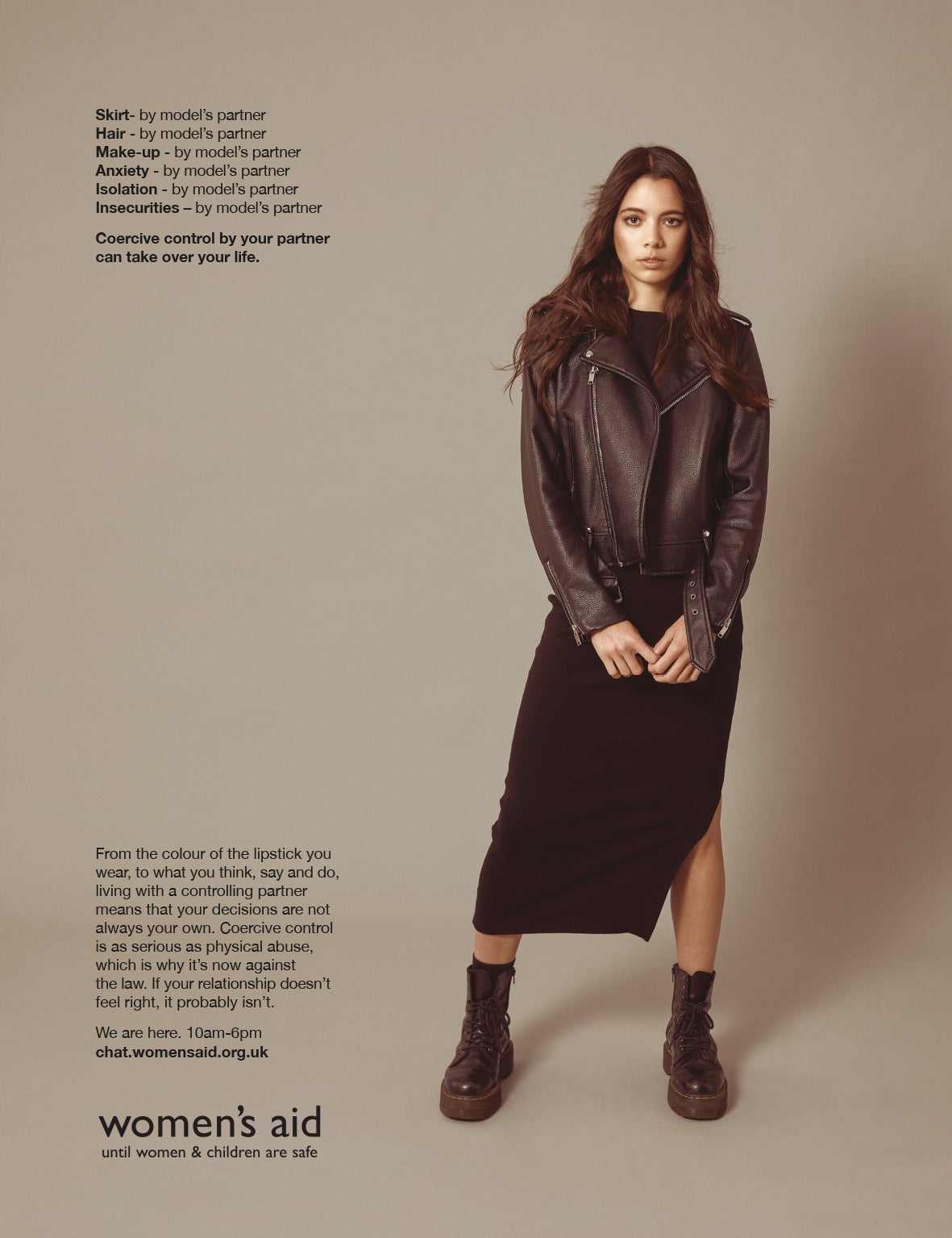‘Not model’s own’: Women’s Aid launches powerful campaign to raise awareness of coercive control
‘From the colour of the lipstick you wear, to what you think, say and do, living with a controlling partner means that your decisions are not always your own’, the charity says

Your support helps us to tell the story
From reproductive rights to climate change to Big Tech, The Independent is on the ground when the story is developing. Whether it's investigating the financials of Elon Musk's pro-Trump PAC or producing our latest documentary, 'The A Word', which shines a light on the American women fighting for reproductive rights, we know how important it is to parse out the facts from the messaging.
At such a critical moment in US history, we need reporters on the ground. Your donation allows us to keep sending journalists to speak to both sides of the story.
The Independent is trusted by Americans across the entire political spectrum. And unlike many other quality news outlets, we choose not to lock Americans out of our reporting and analysis with paywalls. We believe quality journalism should be available to everyone, paid for by those who can afford it.
Your support makes all the difference.Women’s Aid has launched a new campaign to help raise awareness of coercive control, a lesser-known form of domestic abuse.
The campaign, named “Not Model’s Own”, sees three different women posing for what looks like a fashion photoshoot.
In place of where the credits for clothing, styling and photography would usually have been, the powerful campaign highlights the impact of coercive control.
Coercive control is controlling behaviour by which the perpetrator makes a victim dependent on them through isolation from family and friends, regulating their everyday behaviour and depriving them of independence.

To highlight how a perpetrator may control aspects of their partner’s everyday life, the new campaign credits one woman’s top, trousers and trainers as “by model’s partner”.
The same credit applies for a second woman’s skirt, hair, and make-up and a third woman’s top, hair and necklace.
The campaign also raises awareness of some of the warning signs of coercive control and the damage it causes to victims’ mental health.
Anxiety, isolation, insecurities, manipulation, self-doubt, uneasiness, loneliness, desperation and alienation are also listed in the credits as “by model’s partner”.
“From the colour of the lipstick you wear, to what you think, say and do, living with a controlling partner means that your decisions are not always your own.
“Coercive control is as serious as physical abuse, which is why it’s now against the law. If your relationship doesn’t feel right, it probably isn’t,” the campaign says.

According to the Office of National Statistics, 24,856 offences were recorded by police in England and Wales in the year ending March 2020 – an increase from 16,679 cases in the previous year.
“Coercive control can be difficult to identify within a relationship if you don’t know what the signs are,” Farah Nazeer, chief executive at Women’s Aid, says.
“A pattern of different forms of abuse with wide-ranging tactics can make it difficult to define when you are being controlled and manipulated by a partner. Perpetrators slowly isolate survivors from support, deprive them of their independence and regulate their everyday behaviour, gaining more and more control,” Nazeer adds.
Coercive control was first recognised as a criminal offence under the Serious Crime Act 2015 following a campaign by Women’s Aid.
At the time, the legislation covered controlling or coercive behaviour where the perpetrator and victim were “personally connected”, meaning they were intimate partners, former intimate partners or family members who live together.
In June, the government amended this legislation to also include cases where the victim and perpetrator do not live together and post-separation abuse.
“Controlling or coercive behaviour is an insidious form of domestic abuse and this Government is committed to ensuring all victims are protected,” Victoria Atkins, the minister for safeguarding said.
“We recognise that coercive or controlling behaviours may escalate following separation, and that members of a victim’s extended family may be involved in control or coercion.”
Join our commenting forum
Join thought-provoking conversations, follow other Independent readers and see their replies
Comments